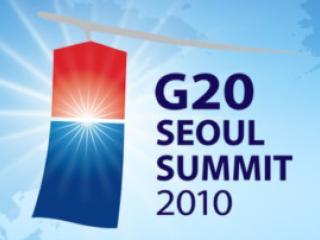GLOBAL IMBALANCES: Ironing out rifts between export-rich countries and debt-laden consumer nations has become the G20's cornerstone. Leaders had already agreed on a "framework" for balanced growth, and submitted medium-term economic plans for IMF review to ensure they do not clash, and the final summit communique did not go much further.
In Seoul, Washington had to give up on getting others to agree to numerical targets for current account deficits and surpluses. Instead, G20 leaders instructed their finance ministers to draw up a set of "indicative guidelines" to measure large current account imbalances, in consultation with the IMF, but left the details to be discussed in the first half of next year.
CURRENCIES: Foreign exchange rates are central to the imbalances debate. The United States and others have cajoled China to allow its yuan currency to rise faster and accuse Beijing of keeping it undervalued to gain a trade advantage.
But Washington faced a tougher time making that case when many of its allies view the Fed's easy money as a means to weaken the dollar.
The leaders vowed to move toward market-determined exchange rates and shun competitive devaluations, a repeat of a commitment made at a G20 finance ministers meeting last month.
But, in a nod to the growing clout of developing economies such as Brazil, G20 said those emerging economies with increasingly overvalued exchange rates that face an undue burden of adjustment would be justified in taking "carefully designed macro-prudential measures" -- code for capital controls -- to counter capital inflows.
At previous G20 summits, leaders have haggled over whether to include a line in the closing statement singling out China for keeping its currency undervalued, but once again this did not happen.
FINANCIAL REGULATION: World leaders signed off on a "Basel III" agreement to raise the quality and quantity of bank capital, the centerpiece of their reforms following the financial crisis. They also be endorsed of the Financial Stability Board's proposals to tighten supervision of the over-the-counter derivatives market and reduce reliance on credit rating agencies.
However, they did not significantly advance the rest of their regulation agenda.
The G20 endorsed a series of broad recommendations by the Financial Stability Board to regulate banks judged "too big to fail" but, with disagreement over issues such as whether such institutions should be subject to further capital surcharges, said more work needed to be done on devising specific measures.
TRADE: Slow-growing advanced economies all want to export their way to economic health, which is the root of the tensions over currencies and imbalances. Leaders made broad pledges not to pursue protectionist policies and to work toward concluding the long-stalled Doha round of trade liberalization talks.
In a blow for the hosts, South Korea and the United States failed to seal a long-stalled free trade agreement, mainly due to disagreement over access for U.S. carmakers to the lucrative South Korean automobile market.
IMF: Leaders endorsed a package of reforms thrashed out by their finance ministers last month to reform the International Monetary Fund to reflect a shift in the balance of global economic power.
Under the deal, more than 6 percent of voting shares at the Fund will shift to dynamic developing countries such as China, which will become the third-biggest member of the 187-strong Washington-based lender.
Outcome of the Seoul G20 summit
World leaders said they would work to tackle global economic "tensions and vulnerabilities" that have raised fears of currency wars and trade protectionism as they wrapped up a Group of 20 summit in Seoul. Following is a summary of what was decided


At previous G20 summits, leaders have haggled over whether to include a line in the closing statement singling out China for keeping its currency undervalued, but once again this did not happen.



 By: N. Peter Kramer
By: N. Peter Kramer
